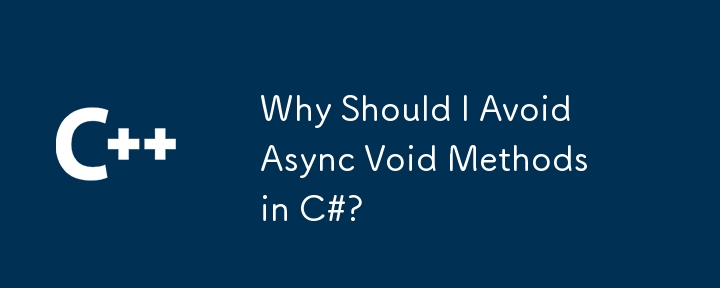Home >Backend Development >C++ >Why Should I Avoid Async Void Methods in C#?
Why Should I Avoid Async Void Methods in C#?
- Mary-Kate OlsenOriginal
- 2024-12-31 06:07:08678browse

The Pitfalls of Async Void: A Detailed Explanation
Async void methods have established themselves as a poor practice in coding. This article delves deeper into why exactly this is the case, referencing the well-known article "Avoiding Async Void."
Reasons for Avoiding Async Void
-
Error Handling Discrepancies:
Unlike sync methods, async void methods handle exceptions differently. Exceptions that occur in an async void method may not propagate upward and can be challenging to catch. -
Composition Challenges:
Async void methods hinder code organization and reuse. Since these methods don't return a task, it becomes difficult to compose them into a larger asynchronous workflow. -
Testability Struggles:
Testing async void methods is a task unto itself. It requires meticulous planning to ensure appropriate coverage of the code and its potential exceptions.
Additional Considerations
Async void is considered an anomaly in the realm of async/await languages. Most languages, including F#, Python, JavaScript, and TypeScript, do not support it. Its inclusion in C#/VB was primarily to accommodate asynchronous event handlers.
A Preferred Approach
In your example, if you adjust your code to utilize async void event handlers:
protected override async void OnLoad(EventArgs e)
{
if (CustomTask == null)
await PrimeCustomTask();
}
private async Task PrimeCustomTask()
{...}
Then the drawbacks of async void will be limited to the event handler, making exception handling, composition, and testing more manageable.
The above is the detailed content of Why Should I Avoid Async Void Methods in C#?. For more information, please follow other related articles on the PHP Chinese website!
Related articles
See more- How do we obtain a floating-point result from integer division in C without altering the integer variables?
- Use addition or subtraction to get the minimum number of steps for N at each step
- How to Iterate over a Packed Variadic Template Argument List Efficiently?
- Can Consteval Functions Enable Template Parameter Dependence on Function Arguments in C 20?
- How Can We Iterate Over a Packed Variadic Template Argument List Concisely?

